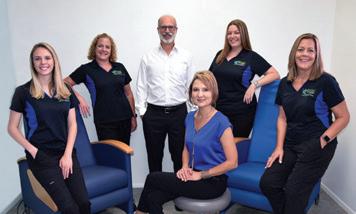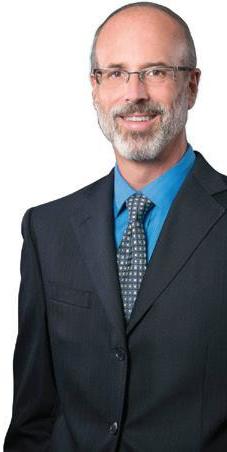
30 minute read
AN INTEGRATIVE
An Integrative Path to Healing:
Q&A with Dr. Fred Harvey by Mary-Elizabeth Schurrer
Advertisement
If there ever was a time for a thorough, in-depth lens into the full spectrum of our health, this would be it. For the past year, our bodies have weakened beneath the pressures of anxiety, fear, stress, loneliness, depression and other mental health concerns that can harm our physical wellbeing too. Now combine these stressors with existing chronic pain, medical issues or the threat of COVID-19 itself, and we are in desperate need of healing at the root level.
That is why I have chosen to focus this month’s Community Spotlight around the topic of integrative medicine. This form of healthcare merges the advanced research and technology of the West with the ancient wisdom and intuition of the East to develop a full-body treatment plan for each individual. In a season, when health can feel tenuous and inaccessible, it’s a relief to know there are practitioners in our own community who are devoted to our wellness. So this month, I want to shine a light on local integrative and functional medicine physician Dr. Fred Harvey for a deeper look at the benefits of these modalities.
Natural Awakenings: Could you summarize integrative and functional medicines’ approach to healthcare, and what does this entail in your practice? Dr. Fred Harvey: Integrative medicine takes a healing-orientated approach which includes the use of both conventional and alternative healthcare methods. We combine Western medical testing and interventions, along with Eastern medicine philosophies which facilitate the body’s innate aptitude to heal itself when the obstructions to healing are removed. Integrative medicine neither rejects conventional medicine nor accepts alternative therapies uncritically, but uses the best of both worlds.
My career began in internal and geriatric medicine when I was drawn into advanced training in alternative medicine after learning from biochemist Dr. Jeffrey Bland, the father of functional medicine, through his ability to synthesize complex scientific ideas. As a result, the Harvey Center for Integrative Medicine (HCIM) in Sarasota is a primary care and consultative practice focused on both integrative and functional medicine which allows for multi-modality treatment options. My goal is to prevent disease rather than just to treat random symptoms by template matching a set of medical insurance codes.
HCIM does not accept insurance due to their restrictive limitations of coverage. In my practice, the team customizes an individualized treatment plan for each unique client. This wellness plan takes into account all physical needs including nutrition, exercise, hydration, sleep and emotional stressors. Due to our thorough attention to detail, a first-time consultation will often require between 90 and 120 minutes.
During an integrative medicine visit, we discuss detoxification, testing for metal and petrochemicals, and treatments for allergies or sensitivities. Often, I see patients with advanced dis-ease, so I work to bolster their systems with a combination of lifestyle changes, nutrition, acupuncture, chiropractic, psychotherapy, nutritional supplements, or in some cases, medications and other interventions like surgery.
Functional medicine is a patientcentered, science-based approach that focuses on revitalizing human function rather than just attacking the symptoms of a disease. Therefore, functional medicine trained physicians identify the root causes of an illness such as poor nutrition, stress, toxins, allergens, genetics and the human microbiome.
Many clients are drawn to my practice from out of state with complicated or misdiagnosed conditions. The increased acceptance of telehealth second-opinion consultations has been extraordinarily successful. As a result, I can review an out of town or isolating client’s lab results and medical records, then advise them on various concerns through a telehealth call. It is common for a loved one or caregiver to participate in the call too. NA: I understand you have been using this telehealth model extensively in the past year. How has it benefited patients during COVID-19? Dr. Harvey We have a mixed model at the Harvey Center for Integrative Medicine. The regulations on telemedicine have become less restrictive due to the pandemic. This allows me to advise patients remotely for chronic illness maintenance follow-ups, lab reviews and new health concerns that might arise.
With clients who are sheltering at home to limit their virus exposure, telehealth enables them to continue scheduling their necessary follow-up visits and remain conscientious about their healthcare. In-person visits are necessary for new patient consultations, primary
care annual physicals and accurate diagnostic tests. To this end, my office team has also done an exemplary job of following the Centers for Disease Control (CDC) health and safety precautions.
As I mentioned, clients who are challenged by their current illness or treatment protocol can also book a telehealth secondopinion consultation to review their history and functional medicine options. In most cases, this is done in collaboration with the primary care physician or another specialist such as a cardiologist, as I often work together with a client’s current practitioners to expand on their beneficial course of action. A second-opinion MD consultation utilizes a second set of experienced eyes and ears to evaluate all options.
NA: What specific treatment modalities do you offer, and what are the most common issues or concerns that you see in patients? Dr. Harvey: We offer a variety of evidence-based treatment options here. Standard functional medicine operates in a similar fashion to the traditional Western model with office visits, history taking, extensive physical evaluation, and laboratory and imaging analyses. With this data, we can then make a treatment plan for each individual based on their own needs.
We offer in-house intravenous therapies, as well as a large Nutripharmacy, with premium vitamins and supplements. Some common health problems we treat are digestive issues or colitis, leaky gut, chronic fatigue, diabetes, high blood pressure, hormone imbalances, weight difficulties, arthritis, brain fog, sleep disturbances and allergies.
NA: February is designated as American Heart Month in the U.S.— what lifestyle shifts do you recommend in order to maintain healthy cardiac function? Dr. Harvey: One of the main foundations of cardiac health is daily movement, so a brisk 30-minute outdoor walk each day provides excellent cardiovascular stimulation and can help to manage stress levels too. Adequate daily water intake is crucial too, as one half-ounce of water for each pound of body weight helps to flush out toxins.
A diet of organic, whole foods low in saturated fats can reduce stress on the vascular system as well. The Mediterranean Diet is an optimal choice for cardiovascular health. It includes 80% fruits and vegetables, with only 20% animal products. For the majority of adults, this equals five to seven vegetable servings and two fruit servings on a daily basis.
Chelation therapy is the most helpful intervention that we offer in our office for cardiac health. If someone has experienced a heart attack, it is shown that 40 treatments over the course of a year will reduce death rates by 20%, and in those with diabetes, by 50%. No other treatment intervention yields these same results.
The Harvey Center for Integrative Medicine is located at 3982 Bee Ridge Road, Suite J, Sarasota. For more information, call 941929-9355, visit HarveyCenter.com or follow on social media at Facebook.com/HarveyCenterForIntegrativeMedicine.
Mary-Elizabeth Schurrer is the Managing Editor of Natural Awakenings Sarasota–Manatee. She also works as a freelance writer, blogger and social media marketer. Her personal blog HealthBeAHippie.Wordpress.com features tips for embracing an active, nutritious, balanced and empowered lifestyle.
What are your Health Goals for 2021?
Detoxi cation? Destress? Dietary? Start today by calling Fred Harvey, MD. Telehealth consults available!
Listen to Dr. Fred Harvey on WMNF radio 88.5FM bi-weekly radio show “Health & Nutrition" Mondays, 10-11am. Taking your calls and email questions on February 1st and 15th Phone 813-239-9663 or dj@wmnf.org
THE HARVEY CENTER FOR INTEGRATIVE MEDICINE
The Harvey Center for Integrative Medicine 3982 Bee Ridge Road, Suite J | Sarasota 34233 Ph 941.929.9355 www.harveycenter.com

Live a Heart-Healthy Lifestyle Integrative Cardiologists on Preventing Heart Disease
by Ronica O’Hara
Cardiology has made mind-boggling advances in efficiently repairing everything from clogged arteries to floppy mitral valves and even replacing the entire failing heart itself. Yet the stubborn fact remains that almost half of all Americans suffer from cardiovascular disease, killing one in four of us, and those numbers are rising. Research shows that simple lifestyle changes can prevent 80 percent of these deaths, but many cardiologists typically reach for a prescription pad rather than explore diet, exercise and other prevention options with their patients.
“Medicine can be life-saving, but optimal heart health can’t come from medicine alone,” says cardiologist Stephen Devries, co-author of Integrative Cardiology. “There is a common belief among many physicians that patients generally don’t want to make lifestyle changes—an assumption that is often dead wrong and refuted by surveys of patients that show that the majority are looking to do exactly that.”
Los Angeles restauranteur and musician Gianni Neiviller, 54, is such a case. When he found holistic cardiologist Cynthia Thaik three years ago, he had already endured four major surgeries for gut illnesses; was suffering from obesity, high blood pressure, anxiety and depression; and was heavily abusing alcohol and marijuana. Thaik ordered tests that uncovered sleep apnea, and she encouraged him to turn to an all-organic diet, take vitamin and mineral supplements, exercise and practice mindfulness and meditation.
“At first it was all fairly hard, but as I started losing the pounds, my mind became more clear, and little by little, it all started getting a bit easier,” Neiviller says. He lost 86 pounds within a year, got sober and ceased taking blood pressure medication and using a sleep apnea machine. He now walks six miles a day; practices a hybrid

regimen of qigong, yoga and meditation; and is switching to a holistic health career. “When people try to push my buttons, they rarely succeed these days,” he smiles.
Rebounding into vibrant health is what integrative cardiologists like Devries and Thaik strive for. Also known as preventive or holistic cardiologists, they focus on guiding patients to change long-held, harmful, physical and emotional practices. Although they are comparatively few in number—probably no more than 100 nationally—these doctors are vocal and influential, imparting valuable advice about preventing and reversing heart disease through daily lifestyle choices.
Heart-Happy Eating
Substantial research affirms that one major line of defense against heart disease is what we put into our mouths every day, yet only 8 percent of cardiologists consider themselves capable to give nutritional advice, a survey showed. To counter that, Devries co-founded the Gaples Institute, a Naperville, Illinois, nonprofit that offers free nutritional training online to the public and nutritional accreditation for medical clinicians. Devries, who trained at Dr. Andrew Weil’s Center for Integrative Medicine at the University of Arizona, lectures internationally and recently authored What Your Doctor May Not Tell You About Cholesterol. “People have a lot more power over their heart health than they realize,” he says.
According to Devries, the name of a diet is not as important as the antiinflammatory foods it should contain, such as “a wide variety of vegetables and fruit, plenty of beans, whole grains in place of refined, minimizing or eliminating meat (especially processed meat like bacon and sausage), minimizing added sugar (especially from sugar-sweetened beverages) and using small amounts of the most healthful oils, like extra-virgin olive oil.” And the evidence is increasing, he says, of “minimizing or eliminating animal products and getting most or all of your protein from high-quality plant sources like beans, tofu, whole grains and nuts.



















THESE DOCTORS ARE AMONG IN AMERICA THE BEST SPINAL DECOMPRESSION PHYSICIANS THESE DOCTORS ARE AMONG IN AMERICA THE BEST SPINAL DECOMPRESSION PHYSICIANS THESE DOCTORS ARE AMONG (Sarasota, Florida) Dr. David Cifra, DC who is board certified in the IN AMERICA THE BEST SPINAL DECOMPRESSION PHYSICIANS THESE DOCTORS ARE AMONG IN AMERICA THE BEST SPINAL DECOMPRESSION PHYSICIANS THESE DOCTORS ARE AMONG IN AMERICA THE BEST SPINAL DECOMPRESSION PHYSICIANS THESE DOCTORS ARE AMONG IN AMERICA THE BEST SPINAL DECOMPRESSION PHYSICIANS THESE DOCTORS ARE AMONG IN AMERICA THE BEST SPINAL DECOMPRESSION PHYSICIANS specialty of Non-Surgical Spinal Decompression has been peernominated and recently recognized by the International Medical Advisory Board on Spinal Decompression. This advanced certification is provided in conjunction with Disc Centers of America, which sets the gold standard in training and research, on the latest, most effective options for the alleviation & treatment of spinal disc disorders, which often cause low back pain, neck pain, sciatica, numbness, tingling, pins and needle sensations and more. Dr. Cifra is committed to helping his patients avoid narcotics, epidural injections, and unnecessary surgeries. Non-Surgical Spinal Decompression provides safe, gentle, and effective relief for upwards of 90% of patients that qualify for care. Dr. Cifra is located at: University Health Park 2415 University Parkway, Sarasota; Bldg 3, Suite 216 SarasotaDiscCenter.com Call (941)358-2224 or (315) 345-7390 today to schedule a FREE CONSULTATION



















Fish is one exception for which there is good evidence.”
He’s backed up by a November 2020 study of 220,000 adults published in the Journal of the American College of Cardiology. It concludes that those with diets high in red and processed meat, refined grains and sugary beverages had a 46 percent higher risk of heart disease and a 28 percent higher risk of stroke compared to those consuming anti-inflammatory diets rich in green and yellow vegetables, whole grains, coffee and tea.
Devries suggests that gradual, incremental changes to the diet may be easier than abrupt and dramatic choices. For example, he might recommend switching from sugary soda to flavored seltzer first, then trying lemon water and black tea with milk before opting for plain, green tea. Sipping a cup of green tea at least every other day reduces the risk of heart attacks and dying of heart disease by one-fifth, Chinese researchers report in the European Journal of Preventive Cardiology.
FLORIDA
NEW MEXICO Dr. Brian Hesser, D.C. 3850 E. Lohman Ave. Las Cruces, NM 88001 575-521-0793 VIRGINIA Dr. Chris Lauria, D.C. 4915 Brambleton Ave. Roanoke, VA 24018 540-725-9501 OHIO Dr. Carey Girgis, D.C. 383 West Main Street WASHINGTON Dr. Steven Thain, D.C. 14700 NE 8th St. # 115 Bellevue, WA 98007 425-644-8386 FLORIDA Dr. David Cifra, D.C. 2415 University Parkway Sarasota, Fl 34243 315-345-7390 NEW MEXICO Dr. Brian Hesser, D.C. 3850 E. Lohman Ave. Las Cruces, NM 88001 575-521-0793 VIRGINIA Dr. Chris Lauria, D.C. 4915 Brambleton Ave. Roanoke, VA 24018 540-725-9501 OHIO Dr. Carey Girgis, D.C. 383 West Main Street Westerville, OH 43081 614-890-3500 WASHINGTON Dr. Steven Thain, D.C. 14700 NE 8th St. # 115 Bellevue, WA 98007 425-644-8386 FLORIDA Dr. David Cifra, D.C. 2415 University Parkway Sarasota, Fl 34243 315-345-7390 2415 University Parkway Sarasota, FL 34243 941-358-2224 NEW MEXICO Dr. Brian Hesser, D.C. 3850 E. Lohman Ave. Las Cruces, NM 88001 575-521-0793 VIRGINIA Dr. Chris Lauria, D.C. 4915 Brambleton Ave. Roanoke, VA 24018 540-725-9501 OHIO Dr. Carey Girgis, D.C. 383 West Main Street Westerville, OH 43081 614-890-3500 WASHINGTON Dr. Steven Thain, D.C. 14700 NE 8th St. # 115 Bellevue, WA 98007 425-644-8386 FLORIDA Dr. David Cifra, D.C. 2415 University Parkway Sarasota, Fl 34243 315-345-7390 NEW MEXICO Dr. Brian Hesser, D.C. 3850 E. Lohman Ave. Las Cruces, NM 88001 575-521-0793 VIRGINIA Dr. Chris Lauria, D.C. 4915 Brambleton Ave. Roanoke, VA 24018 540-725-9501 OHIO Dr. Carey Girgis, D.C. 383 West Main Street Westerville, OH 43081 614-890-3500 WASHINGTON Dr. Steven Thain, D.C. 14700 NE 8th St. # 115 Bellevue, WA 98007 425-644-8386 FLORIDA Dr. David Cifra, D.C. 2415 University Parkway Sarasota, Fl 34243 315-345-7390 NEW MEXICO Dr. Brian Hesser, D.C. 3850 E. Lohman Ave. Las Cruces, NM 88001 575-521-0793 VIRGINIA Dr. Chris Lauria, D.C. 4915 Brambleton Ave. Roanoke, VA 24018 540-725-9501 OHIO Dr. Carey Girgis, D.C. 383 West Main Street Westerville, OH 43081 614-890-3500 WASHINGTON Dr. Steven Thain, D.C. 14700 NE 8th St. # 115 Bellevue, WA 98007 425-644-8386 FLORIDA Dr. David Cifra, D.C. 2415 University Parkway Sarasota, Fl 34243 315-345-7390 ILLINOIS NEW MEXICO Dr. Brian Hesser, D.C. 3850 E. Lohman Ave. Las Cruces, NM 88001 575-521-0793 VIRGINIA Dr. Chris Lauria, D.C. 4915 Brambleton Ave. Roanoke, VA 24018 540-725-9501 OHIO Dr. Carey Girgis, D.C. 383 West Main Street Westerville, OH 43081 614-890-3500 WASHINGTON Dr. Steven Thain, D.C. 14700 NE 8th St. # 115 Bellevue, WA 98007 425-644-8386 FLORIDA Dr. David Cifra, D.C. 2415 University Parkway Sarasota, Fl 34243 315-345-7390 ILLINOIS Dr. Richard Lohr, D.C. NEW MEXICO Dr. Brian Hesser, D.C. 3850 E. Lohman Ave. Las Cruces, NM 88001 575-521-0793 VIRGINIA Dr. Chris Lauria, D.C. 4915 Brambleton Ave. Roanoke, VA 24018 540-725-9501 OHIO Dr. Carey Girgis, D.C. 383 West Main Street Westerville, OH 43081 614-890-3500 WASHINGTON Dr. Steven Thain, D.C. 14700 NE 8th St. # 115 Bellevue, WA 98007 425-644-8386 Dr. David Cifra, D.C. 2415 University Parkway Sarasota, Fl 34243 315-345-7390 February 2021 ILLINOIS Dr. Richard Lohr, D.C. Westerville, OH 43081 614-890-3500ILLINOIS Dr. Richard Lohr, D.C. 3090 N. Main Street Decatur, IL 62526 217-706-5551 ILLINOIS Dr. Richard Lohr, D.C 3090 N. Main Street Decatur, IL 62526 217-706-5551 ILLINOIS Dr. Richard Lohr, D.C. 3090 N. Main Street Decatur, IL 62526 217-706-5551 ILLINOIS Dr. Richard Lohr, D.C. 3090 N. Main Street Decatur, IL 62526 217-706-5551 Dr. Richard Lohr, D.C. 3090 N. Main Street Decatur, IL 62526 217-706-5551 3090 N. Main Street Decatur, IL 62526 217-706-5551 . 25 3090 N. Main Street Decatur, IL 62526
Sandhill Healing Center, Inc. Sandhill Medical Thermography Serving Charlotte County since 1992 Non-Invasive • Experience the Difference!
Medical Thermography NO Compression • NO Radiation • NO Pain Med-Hot Thermal Imaging Systems is a unique technology that measures and records skin temperature patterns and variations emitted from the human body. It helps illustrate a body’s physiology by showing patterns of active inflammation along with an increased blood supply feeding an existing disease pattern. OUR Services Include: • Experienced, Professional, Certified Clinical Thermographers • Highest quality Medical High-Definition Camera provides finest images for precise interpretation • All images analyzed by specially trained and certified MD’s with written report • Report discussed and given to you with copies of your images, patient education • A new look at the inflammatory process and functionality of the body • Affordable Imaging Packages
Acupuncture • Detox • Chiropractic • EEG Biofeedback • Medical Thermography 24901 Sandhill Blvd. Ste 8 at Deep Creek Commons, Port Charlotte 941 235-8929 SHH.ABMP.COM
“Life’s too short for boring food!”
For more information contact the restaurant at 941.412.4334.
Café Evergreen - Healthy Food, Healthy Life
801 Tamiani Trail S. • Nokomis, Fl 34275 www.cafeevergreen.net • 941.412.4334
Powerful Supplements
As a young cardiologist frustrated by the revolving-door nature of his patients, Stephen Sinatra came upon an obscure 1982 study of coenzyme Q10 (CoQ10) that he realized could have saved the life of a favorite patient. This catalyzed his intensive studies into nutrition and bioenergetics that produced 17 books, including the bestselling Reverse Heart Disease Now and The Sinatra Solution. He helped formulate the new field of metabolic cardiology that proposes preventing and treating cardiovascular disease with nutraceuticals to improve energy production in heart cells.
In addition to suggesting a high-potency, multi-nutrient, fish oil, magnesium and vitamin C for prevention, he recommends four key nutrients that produce and use adenosine triphosphate (ATP), the body’s basic cellular fuel: YCoQ10 is synthesized in the body, but declines with age and statin use. It protects from the free radical damage linked to inflammation. Dosage: 90 to 250 milligrams (mg) daily for prevention, 180 to 360 mg for hypertension and 300 to 600 mg for heart failure. YL-carnitine ferries fatty acids to be oxidized to make ATP and moves toxic metabolites out of heart cells. Dosage: 1,000 to 1,500 mg in divided doses to prevent deficiency and up to 3,000 mg for heart disease. YMagnesium, required in all reactions involving ATP, is depleted by some gastrointestinal medications and diuretics. Dosage: at least 400 mg. YD-ribose is a naturally occurring sugar derivative of ATP that hastens energy regeneration. Dosage: five to seven grams (gm) daily as a preventive, seven to 10 gm daily for heart failure. In other nutrient news, adults that took glucosamine/chondroitin every day for a year or longer had a 65 percent reduction in cardiovascular-related deaths, reports West Virginia University researchers that analyzed 16 years of data from 16,686 adults.
Smart Testing
Preventive cardiologist Joel Kahn, the author of Your Whole Heart Solution and The Plant-Based Solution, says that lab tests typically prescribed by cardiologists and other doctors are inadequate. “Standard lab tests have not changed in 30 to 40 years, but science has,” he says. “For example, inflammation is now understood to be a fundamental process for most chronic diseases like heart disease and cancer. A simple lab test, hs-CRP, is available to measure inflammation. Very few doctors add this to their panel. When it is high, it leads to a search for why there is inflammation and diet, lifestyle and other measures to resolve it.”
After 25 years as a cardiologist treating heart-attack emergencies, Kahn, who is vegan, went back to college to study preventive cardiology and set up the Kahn Center for Cardiac Longevity, in Bingham Farms, Michigan, which focuses on dietary counseling and preventive screenings. His list of “must have” tests includes: YAdvanced cholesterol panel for a breakdown of LDL-
cholesterol particle number and size, which is highly predictive of cardiovascular problems. YLipoprotein(a) cholesterol to detect a risk-elevating genetic form of cholesterol that’s present in about 20 percent of those tested. YHigh-sensitivity C-reactive protein (hsCRP) to identify inflammation of blood vessels. YHemoglobin A1c (HbA1C) to obtain the three-month measure of sugar in hemoglobin, a marker of both diabetes and heart disease. YVitamin D to identify deficiencies linked to a higher risk of hypertension, heart failure, angina and heart attacks.
Move It or Lose It
The American Heart Association recommends 150 minutes per week of moderate-intensity aerobic activity (brisk walking, water aerobics, gardening, tennis, dancing) or 75 minutes of vigorous activity (running, jumping, swimming laps), as well as musclestrengthening activity (weights) at least two days a week.
Only 20 percent of adults exercise for the full 150 minutes per week, which may be why physical inactivity is a major factor in an estimated one-third of heart disease deaths. “I like to frame it as ‘being active’, because exercise sounds onerous,” Devries says. “Even a small amount of activity goes a long way—walking at a gentle pace 30 minutes a day confers very significant benefits. Up to a point, more can be better, but only for some people, and only to a point.”
Even moving a few minutes daily can add up. Doing 12-minute bursts of vigorous exercise favorably impacts 80 percent of the metabolites that govern such functions as oxidative stress, inflammation and vascular reactivity, reports a new study in Circulation. Just one hour a week of strength training significantly lowers the risk of heart attack, stroke and heart disease death, another study found. And simply holding thigh and calf stretches for 45 seconds for a total of five minutes daily improved arterial blood flow, reports a study in the Journal of Physiology.
The Emotional Heart
As a child in Myanmar, Thaik witnessed hands-on healing at a clinic she visited with her physician mother, but holistic care only entered her life after 20 years of practice as a frustrated cardiologist, when she was laid low by severe anemia that required transfusions and surgery. Today, the Harvard-trained cardiologist is the author of Your Vibrant Heart and founder of the Holistic Heart Healing Center, in Los Angeles, which integrates the medical model with lifestyle strategies and approaches like homeopathy and acupuncture.
“I very much believe that we are both physical beings and energetic or spiritual beings. Our physical makeup is closely intertwined with our mental and emotional makeup,” Thaik says. She counsels patients to practice the following: YMindfulness. “A mentor of mine, (life coach) Mary Morrisey, taught me to avoid the three Cs—complaining, comparing or criticizing. If you attempt to do this for even an hour, you will find that it is actually a hard task. Practicing this allows us to be acutely mindful of our thoughts.” YGratitude. “I wake up every morning and before my feet hit the floor, I make this statement five times and fill in five different answers: ‘I am so happy and grateful now that ...’” YReleasing. “I believe the most important ingredient to health and healing is the ability to release—to forgive self and others, to let go and abandon all of our negative thoughts, our self-limiting beliefs, our notions of right and wrong, our feelings of injustice and being wronged.” She advises, “When we can abandon all these beliefs and allow ourselves to float or drift unimpeded—imagine yourself on a tube in a lazy river—that is when healing within our bodies begins, when our parameters of stress and the hormones and neurotransmitters associated with stress start to down-regulate, and we can literally feel a wave of relaxation passing through our bodies. This will lower our heart rate, blood pressure, adrenaline and cortisol levels, thereby mitigating our risk of a heart attack or stroke.”
Ronica O’Hara, a natural health writer, can be contacted at OHaraRonica@gmail.com.
More Heart-Healthy Strategies
take long soaks. Middle-aged Japanese adults that took a daily bath in warm or hot water had a 28 percent lower risk of cardiovascular disease and a 26 percent lower risk of stroke than people that didn’t bathe in the tub more than twice a week, concludes a study in the journal Heart.
outdo each other. People that competed with each other to walk more steps ended up walking about 100 miles more in nine months than people that simply walked on their own, reports the JAMA Internal Medicine.
consider cannabidiol. This non-psychoactive form of cannabis has been shown in small lab studies to lower inflammation and ease arrhythmia. “CBD can help to reduce stress, lower blood pressure, improve anxiety and depression, reduce inflammation, improve glucose regulation, diminish pain and thereby lower our adrenergic (fight-or-flight) tone,” says holistic cardiologist Cynthia Thaik.
brush a lot. In a 10-year Korean study, people that brushed their teeth three or more times a day had a 10 percent lower risk of atrial fibrillation and a 12 percent lower risk of heart failure.
sidestep pollution. Stay away from traffic and industrial areas when exercising. Even a few hours of exposure to the ultrafine particles generated by emissions may potentially trigger a nonfatal heart attack, reports research in Environmental Health Perspectives.
green living
Saying ‘I Do’ to the Planet Green Weddings Embrace Sustainability
by Sandra Yeyati
From advising couples about Earth-friendly menus to reducing and reusing plastic in her business operations, wedding planner Erica Jill Razze, of Capiche Custom Events, in Wilmington, Delaware, is dedicated to environmentalism. When designing her own wedding last year, she wanted it to serve as a portfolio example of sustainability. “Our parents are a little more traditional, so there were certain aspects that we tried to respect and uphold for them, while still finding our happy place from an environmental standpoint,” she says.
Although no wedding can be totally zero waste, there are always greener options, starting with the invitations. The most ecofriendly choice is email, which Razze’s parents declined to use, so she opted for the next best thing: biodegradable, non-toxic paper directly benefitting women in India. In lieu of a response card, which would have required more paper and another mailing, she created a website for RSVPs. Bridal shower invitations were printed on botanical paper embedded with seeds. Invitees that followed the planting instructions were delighted to welcome blooming flowers in their yards.
“Find a venue that already fits your theme, so that you’re not trying to transform a space or shipping in plastic decorations that add to the carbon footprint and end up in landfills,” says Razze, who prefers horticultural centers or outdoors spaces. “The beauty and simplicity of what’s around you is what makes it so wonderful,” she says. “Don’t try to turn a ballroom into a forest and vice versa.”
Flown-in, farmed flowers are a big no-no. “The transportation is a huge carbon footprint. If they’re growing one particular flower, they’re treated with pesticides,” Razze says. Sustainable alternatives are locally harvested, organic wildflowers; dried flowers that haven’t been sprayed or painted with toxic chemicals; silk blooms; and rented potted plants. Some local florists collect flowers after the event for composting. Heart-shaped confetti made of dried leaves is a clever swap that begins composting once it hits the ground.
Razze’s vegan meal offered another planet-saving opportunity. While real stoneware and silverware gets expensive because it requires hiring staff, single-use plastics that are gold-decorated to simulate real china betray the Earth and believability. “You’re not fooling anybody with that stuff,” she says, recommending less costly alternatives like biodegradable bamboo and palm-leaf disposables. “Instead of fake-impress, show people something new. Thankfully, taking care of the environment has become trendy, so it’s an easier sell.”
Instead of wedding favors, most of which come from China and are wrapped in plastic, donate meals to people that don’t have access to food, advises Emily Raezer, director of weddings at Global Gourmet Catering (GGC), in San Francisco. “A lot of times, guests don’t even take those favors home. Why not make a donation that’s going to have a social impact?” GGC also donates all event leftovers to food banks in local communities. As the first green-certified caterer in Northern California, GGC educates wedding clients about sustainability, helping them

choose menu items that are in season, organic, locally sourced, sustainably farmed and drought-friendly. Raezer explains the reasoning behind these principles: “We don’t want things traveling very far and having CO2 emissions. Growing things out of season costs the environment water and other resources, and some products are more drought-friendly—which explains choosing avocados over cucumbers. Sustainable fishing really impacts our oceans, so we won’t source any fish that’s on the Monterey Bay watchlist, and a lot of couples are cutting out red meat from their weddings because of the methane emissions.”
GGC goes to extraordinary lengths to minimize impacts caused by their events, including reclaiming and repurposing used vegetable oil for San Francisco’s alternatively fueled vehicles; serving filtered tap water to avoid using plastic water bottles; opting for biodegradable and reusable utensils and decorations; recycling whenever possible; partnering with local farms to compost efficiently; and using non-toxic dishwasher detergents. For every event, they donate a portion of the proceeds to Terrapass for carbon offsets.
Despite all preparations, couples must be ready for the unexpected. When the COVID-19 shutdown hit last March, just two months before Razze’s May wedding, she decided to legally marry in a small gathering of fewer than 10 people and postponed her larger green reception for a year. “We want to celebrate with everybody,” she says. “In a year, it could be a vow renewal. How cool is that?”
Sandra Yeyati, J.D., is a professional writer. Reach her at SandraYeyati@gmail.com.
Earth-Friendly Engagement Rings
Among environmentally and socially conscious couples, traditional engagement rings purchased at Tiffany’s that feature the largest diamond three month’s pay will buy are not so cool when more ethical, sustainable and meaningful options are available. One goal is to use conflict-free or ethical diamonds that are not associated with civil wars, unfair pay, unsafe working conditions, human rights abuses and unsavory environmental practices. Earth-friendlier choices include rings inherited from family members or purchased at estate sales, as well as lab-generated gems and custom-designed, one-of-a-kind rings.
According to jewelry designer Amanda Jaron, of Naples, Florida, there’s a trend in the younger, first-time wedding market toward alternative gems. “It might be a lab-created diamond like a moissanite, or what they call a salt-and-pepper diamond, which has many black and white inclusions [imperfections], giving the stone a speckled or smoky look.”
Gemstones and jewelry handed down by family members or acquired at an estate sale are also popular and represent the bulk of Jaron’s creative work. “There’s nothing more special than a gemstone that has two or three decades worth of life to tell,” she says. “I love being able to create fabulous, modern pieces that my clients can wear proudly. What’s better than a sparkly treasure that also has sentimental value?”
Servings for the Heart
Blueberry and Pumpkin Seed Yogurt Bark
courtesy of laura flippen This dessert is for lovers of froyo, ice cream or frozen treats. Plain yogurt is blended with refreshing mint, sweet blueberries and a hint of honey—all topped with crunchy pumpkin seeds. This bark can also be an easy breakfast alternative that balances high-quality protein, dietary fiber and heart-healthy fats. Eat this delicious snack in a bowl to catch the yogurt bark liquid goodness as it melts. Add a drizzle of dark chocolate for extra decadence.
Yield: 6 servings
2 cups nonfat plain yogurt 1¼ cups blueberries, divided 1 Tbsp coarsely chopped fresh mint 1 tsp honey ¼ cup raw, unsalted, pumpkin seeds
Line a baking sheet with parchment paper, making sure the edges are covered. In a medium-size bowl for a food processor, combine the yogurt, 1 cup of blueberries, the mint and honey. Blend until smooth, about 2 minutes. Using a rubber spatula, evenly spread the yogurt mixture over the parchment paper. Evenly add the remaining blueberries along with the pumpkin seeds on top of the yogurt mixture. Freeze for 2 to 4 hours until the bark is fully frozen. The best way to check is to poke the middle of the pan with a fork to see if it has hardened. Once fully frozen, the edges should easily lift, as well. Break the bark up into 12 pieces and freeze in an overnight container or a freezer-safe, zip-top bag for up to one month.
Ensure your own health and well-being
• No Ammonia/PPD • Organic • Salon/Spa • Certified Green Business









